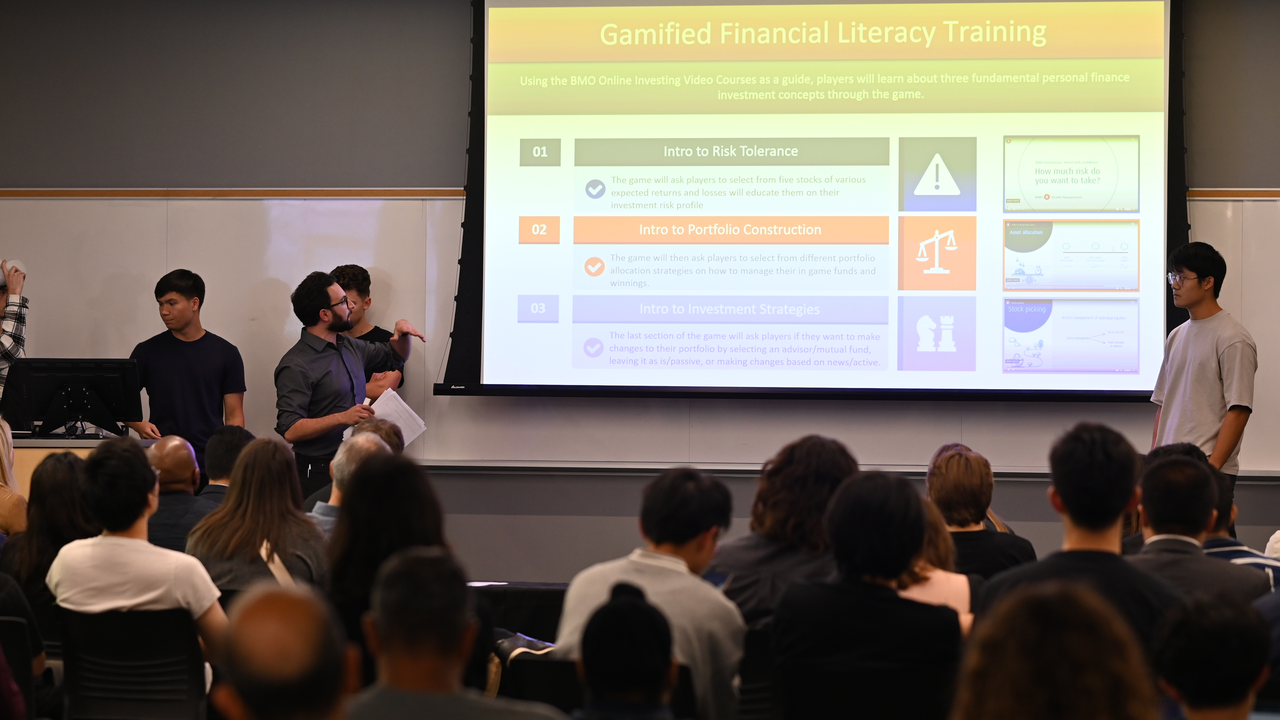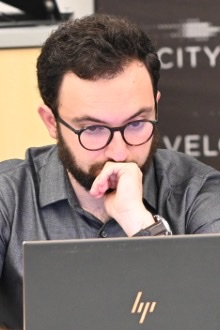
Innovation Challenge winner embraces AI and the path of entrepreneurship
Joseph Scarfone, a master of sustainability management student, brings calculated risk-taking to cross-faculty collaboration

Joseph Scarfone, a master of sustainability management student, brings calculated risk-taking to cross-faculty collaboration
By Bruno Bustos Alegria Faculty of Environment Joseph Scarfone had a career in investment banking before exploring entrepreneurship. Looking to gain an understanding of sustainable finance, reporting mechanisms and artificial intelligence, he joined the Faculty of Environment to pursue a master of sustainability management. Now, in a new career chapter, he participated in the Innovation Challenge: Imagining the Future of Finance run by Velocity. During the two-week-long challenge, Velocity partners BMO, Rogers, and Unity hosted workshops to prepare students for the finals.
Joseph Scarfone had a career in investment banking before exploring entrepreneurship. Looking to gain an understanding of sustainable finance, reporting mechanisms and artificial intelligence, he joined the Faculty of Environment to pursue a master of sustainability management. Now, in a new career chapter, he participated in the Innovation Challenge: Imagining the Future of Finance run by Velocity. During the two-week-long challenge, Velocity partners BMO, Rogers, and Unity hosted workshops to prepare students for the finals.
“Even if you didn’t necessarily know what virtual reality (VR) was, what the future of finance is, or how personal banking works, there was a chance to learn,” he said.
To create a solution, Scarfone and his team, Fintopia, brainstormed to narrow down ideas by considering the challenge's parameters. They created a VR game that immerses the user in a fun and informative learning experience to educate and promote healthy financial habits like budgeting, saving, and investing.
“Working on the first day, it didn’t seem like we were making a lot of progress,” he reflects. “That could be a low point for some people, but it could also be a high point because it forces you to really think about how you can adjust what you’re doing. You learn more from your failures than your successes.”
In the end the team placed third in the finals. Embracing an attitude of calculated risk-taking, Scarfone expects to continue learning about evolving technologies that impact every aspect of society. “When I first applied for my master’s at Waterloo, I was thinking I would just focus on sustainable finance and sustainable reporting. But since the Innovation Challenge experience and given the large focus on AI, I’m going to try to pivot more towards emerging technologies.”

Top three teams from the Innovation Challenge.
When asked about his experience as one of a few students representing the Faculty of Environment at Velocity’s Innovation Challenge, Scarfone notes how technology and the environment relate.
“Environment students maybe are thinking, what do I know about business or what do I know about technology, but it's that systems thinking that is the most important thing that you bring to the table.”
“Participating in entrepreneurship challenges is almost like doing a mini co-op for three days in the field instead of four months. It’s a way for you to be exposed to something new and learn a lot, but not have as much stress or time commitment.”
Want to see live pitching? The Velocity Pitch Competition on November 15 and 16 is a great opportunity to see live pitching in action, where 25 student teams from all faculties will have three minutes to convince a panel of judges of their businesses' potential and viability.

Read more
Redefining capstone learning by bringing students, faculty and community partners together to tackle real-world challenges

Read more
Here are the people and events behind some of this year’s most compelling Waterloo stories

Read more
From transforming solutions for homeownership to advancing health care interventions, Waterloo talent continues to disrupt industries and drive change
The University of Waterloo acknowledges that much of our work takes place on the traditional territory of the Neutral, Anishinaabeg, and Haudenosaunee peoples. Our main campus is situated on the Haldimand Tract, the land granted to the Six Nations that includes six miles on each side of the Grand River. Our active work toward reconciliation takes place across our campuses through research, learning, teaching, and community building, and is co-ordinated within the Office of Indigenous Relations.